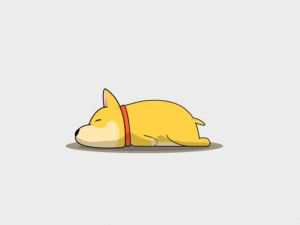
THE CASE FOR HUMAN BEDS
PROS
+ It boosts your bond. Some believe this is especially true since dogs are pack animals, sleeping and hunting together in the wild.
+ Extra warmth for cold winter nights. Plus, your furry friend will never complain about your cold toes!
+ Built-in guard dog. For those living alone and worried about nighttime intruders, knowing your cuddle buddy would “sic ’em” in a heartbeat could be a source of comfort.
CONS
– Your snuggle buddy could get clingy. For dogs with separation anxiety, sharing a bed could worsen the problem, experts say.
– Dog hair. Everywhere. Nighttime snuggles may come with the burden of having to change sheets more often. It may also come with the unintended consequence of having to bathe your dog more often — unless you don’t mind a little dirt and mud on the pillows after a day at the park.
– Decreased sleep quality. While a 2018 study by the Mayo Clinic recently revealed that sleeping alongside your dog is not likely to disrupt your sleep patterns, some pet owners, like Federico, are still convinced their dreamtime is at least somewhat affected, though it may depend on dog’s temperament, the vet says.

THINGS TO CONSIDER
> Your sleeping habits. Your cuddly little friend gets to sleep in all day, so he or she might not mind being disturbed by your tossing and turning. But Sarah Speer, director of operations at The Ark Pet Spa & Hotel in East Brainerd, says it’s not unusual for her to see tiny dogs limping slightly the day after their owners rolled over on them by accident.
> Your bed’s material. A feather bed may seem cozy and inviting, but just one tear from those excitable paws and you’ll have feathers everywhere.
> Your house rules. If your dog is not allowed on the couch, they should not be allowed on the bed, Speer says. Dogs need consistency. It will be difficult for them to understand they’re allowed on one piece of furniture but not another, she explains.
THE CASE FOR DOG CRATES
PROS
+ Peace of mind for owners. Imagine if you could drift off to sleep every night with no worries about waking up to find the contents of your kitchen pantry torn to shreds or a freshly delivered “surprise” awaiting you on the carpet.
+ Easy to travel with. Plus, bringing the familiar hideaway on the trip could make it easier for your pup to adapt to strange, new surroundings.

CONS
– Long training time. Today, Cash will obediently retreat to his crate at the point of a finger, but the training process didn’t happen overnight. It took many, many nights, several of which were filled with whining, begging and gnashing of teeth — and not all from the dog.
– More consequences for carelessness. Locking a dog in a crate for too long can lead to the development of harmful behaviors born from stress or boredom, such as sores formed by constant licking. Since dogs are social animals, the extended confinement can also lead to eating disorders, depression, aggression or hyperactivity, studies show.
THINGS TO CONSIDER
> Your dog’s sleeping habits. If your dog prefers to sleep curled up, Speer recommends a bed with a soft-sided frame along the edges. If your dog likes to stretch out while sleeping, however, it might be best to get a flat bed with no borders.
> Your dog’s breed. For dogs that are genetically predisposed to arthritis, hip dysplasia or other joint problems — such as German shepherds, dachshunds and rottweilers, to name a few — it may be a good idea to invest in a memory foam dog bed. Researching your dog’s breed can also help determine preferences. For example, since dachshunds are natural diggers, they might be most comfortable in a dog bed with a physical cover over the top, she says.
> Your dog’s size. Your pooch should be able sit up comfortably without his or her head touching the top of the crate. Speer recommends owners always purchase crates a size larger than they think they’ll need, especially if buying online.
> Your dog’s past. If your dog is a rescue or has trauma related to kennels or other confined spaces, consider other options.

